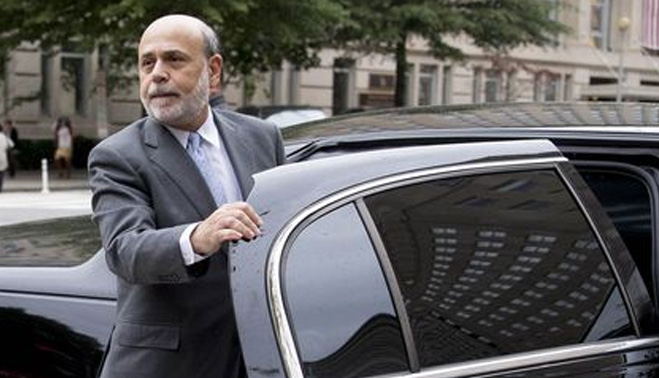![]() Home > World Business
Home > World Business
Japan’s Abe Tells Bernanke He Wants To Speed Up End Of Deflation

![]() July 13th, 2016 | 08:29 AM |
July 13th, 2016 | 08:29 AM | ![]() 1129 views
1129 views
JAPAN
Japanese Prime Minister Shinzo Abe told former Federal Reserve Chairman Ben S. Bernanke at a meeting in Tokyo he wants to speed up the nation’s exit from deflation, underscoring his commitment to implementing fresh economic stimulus.
"We are only halfway to the exit from deflation," Abe said at the start of the meeting at his residence Tuesday. "We want to be steadfast in accelerating our breakaway from deflation."
Abe’s remarks at the meeting, also attended by the Ministry of Finance’s top currency official Masatsugu Asakawa and adviser Koichi Hamada, came before he ordered Economy Minister Nobuteru Ishihara to compile stimulus measures this month.
Speaking later, Ishihara didn’t hint at the size of the package, saying it may be funded through the issuance of construction bonds rather than deficit bonds. The government indicated it wants to make full use of the low interest rate environment.
Hamada told reporters after the meeting that Bernanke asked Abe to carry on with his economic policies dubbed Abenomics by supplementing monetary policy with fiscal policy. Bernanke told Abe that the Bank of Japan still had the instruments to further ease monetary policy, said Yoshihide Suga, Japan’s top government spokesman.
Bernanke met Haruhiko Kuroda, the central bank governor, for lunch Monday. The BOJ issued no statement on the substance of those talks, which come three weeks before its next policy meeting as it confronts a fresh strengthening in the yen this year that risks undermining inflation and weakening the appetite for investment and wage increases.
For Bernanke, offering views on Japan’s challenges and policy options would be nothing new. He delivered a famous 2003 speech calling for greater cooperation between monetary and fiscal policy makers to defeat deflation and spur the economy.
Previous Meetings
In the room during Bernanke’s meetings with Japanese officials 13 years ago in Tokyo: Abe and Kuroda, who a decade hence unleashed an unprecedented stimulus to revive Japan. Now, that project is increasingly at risk with inflation moving away from the BOJ’s target, and gross domestic product growth far from Abe’s goals.
Bernanke’s 2003 visit, when he was a Federal Reserve Board member, and his message at the time is still discussed by BOJ officials. Japan has a tradition of seeking the advice of overseas experts, something that’s been taken to a new level under Abe, who consulted with Nobel laureates Paul Krugman and Joseph Stiglitz prior to his decision in June to delay a sales-tax hike. Unlike with this week’s Bernanke visit, the meetings with Krugman and Stiglitz were well-publicized.
This time, the former Fed chief, whose roles now include that of a fellow-in-residence at the Brookings Institution in Washington, come at a tough moment for the BOJ. While Kuroda’s initial 2013 stimulus succeeded in sending down the yen -- boosting exporters’ profits and inflation -- his most recent strategy has faced popular disapproval.
In a surprise move in January, the BOJ unveiled a negative interest-rate policy that commercial banks have criticized for hurting their profits and damaging confidence. Meanwhile, bond market participants and some former BOJ officials have criticized the core of Kuroda’s program -- massive purchases of government debt -- for damaging the function of the bond market.
There has been no sign yet from Kuroda and his colleagues that he is looking for a new means of stimulating the economy. On the fiscal front, Abe is preparing a spending package to be completed later this year, with no details on the size or the funding.
Bernanke in April published on his Brookings blog that, while there were many challenges behind such a strategy, a “monetary financed fiscal program” shouldn’t be ruled out in the case of an emergency in the U.S.
Extreme Scenario
“Under certain extreme circumstances -- sharply deficient aggregate demand, exhausted monetary policy, and unwillingness of the legislature to use debt-financed fiscal policies -- such programs may be the best available alternative. It would be premature to rule them out,” Bernanke wrote.
Hiroaki Muto, chief economist at Tokai Tokyo Research Center, said Bernanke’s visit to Tokyo will spur speculation over further monetary easing by the BOJ.
“The BOJ probably won’t be able to do nothing and stand pat at its July meeting,” Muto. said. “It may have little choice but to take additional steps.”
In Muto’s view, these steps could include a deeper cut to the negative interest rate or increased purchases of exchange-traded funds.
Source:
courtesy of BLOOMBERG
by Emi Nobuhiro and Yoshiaki Nohara
If you have any stories or news that you would like to share with the global online community, please feel free to share it with us by contacting us directly at [email protected]